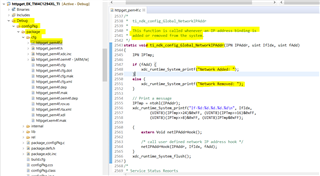Part Number: TM4C1290NCPDT
Hi
I am using TM4C129ENCPDTI in CCS Version 12.2.0, TI-RTOS for TivaC 2.16.01.14, XDCtools v 3.32.0.06_core and Compiler ti-cgt-arm_20.2.7.LTS and wolfssl-3.9.10-stable.
I try to communicate the TM4C1290NCPDT to server .We have connected board to router and got IP address and sending data to a server. after some time the network connectivity is lost and that time I need to do other tasks, How to check the network connectivity is lost ?
I using httpsget example, once IP address is assigned that time the console is print the "network Added" and if the Ethernet link becomes down, it does not print to "Network Removed".


